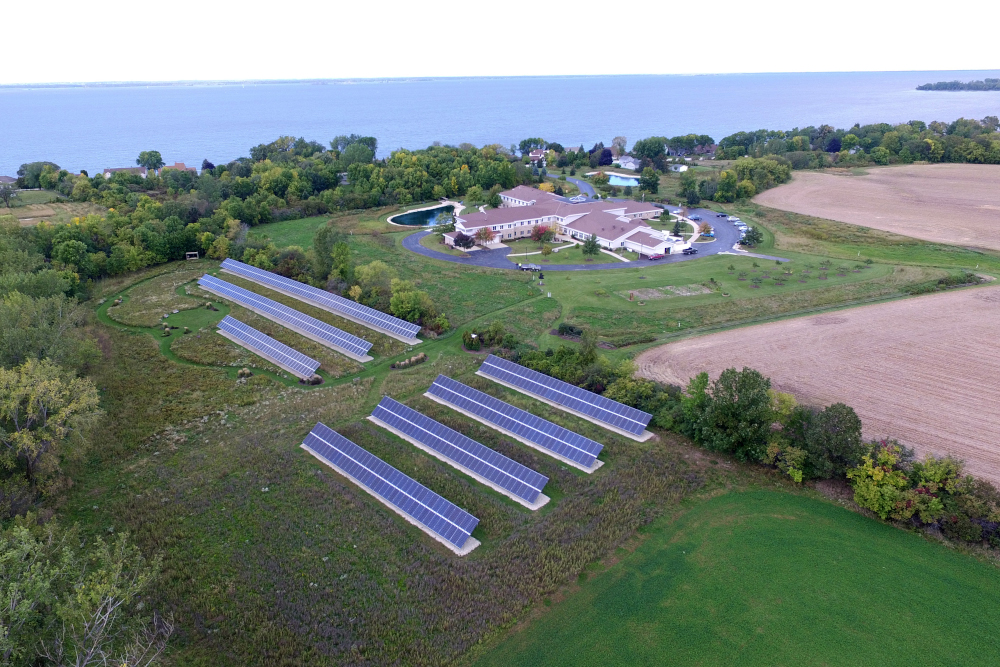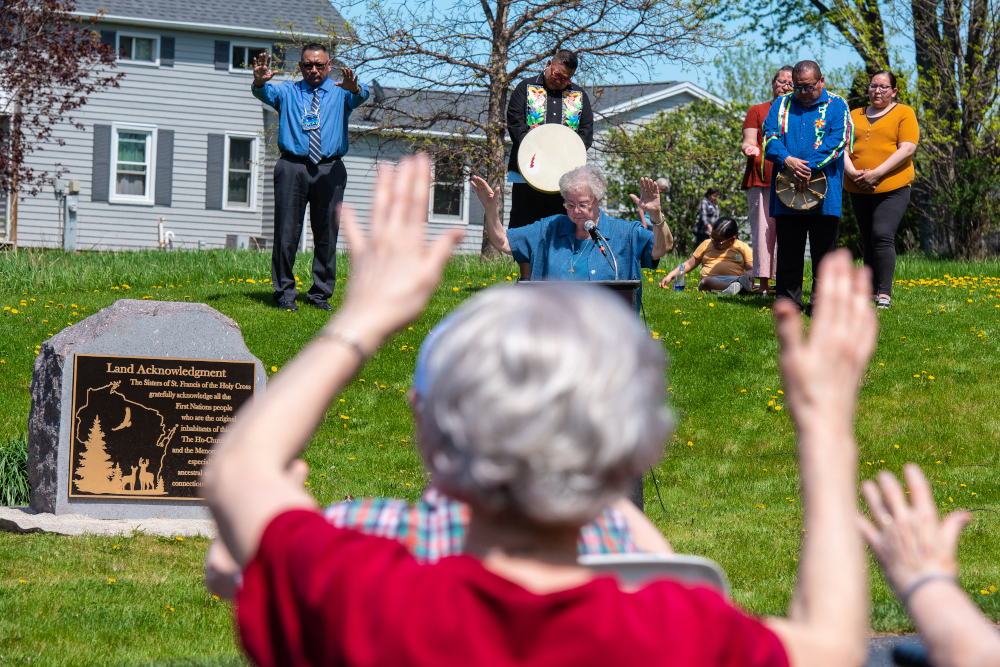
St. Francis Convent, home of the Sisters of St. Francis of the Holy Cross, is situated near Wisconsin's Bay of Green Bay, which flows into Lake Michigan. (Randy Kostichka/Sisters of St. Francis of the Holy Cross)
During the summer months for much of the past decade, the Sisters of St. Francis of the Holy Cross have invited the community to join them in quiet contemplation near the end of the day, as the sun dips below the horizon on the shores of Green Bay.
The "Silence & Sunset" program brings visitors to St. Francis Convent, the congregation's 10-acre motherhouse on the coast of the body of water that gave the town its name, where they can walk through wildflowers and prairie grass and enjoy the outdoors in peace and quiet. At the end of the program, everyone gathers in prayer and sings a song of praise to celebrate the experience in nature.
"It's a way of spreading our spirit of care for Earth, hospitality, prayer," said Sr. Rose Jochmann, community president of the Green Bay Franciscans.
Silence & Sunset is one of many ways the sisters have centered care for creation into their ministry for decades. As part of Catholic Sisters Week 2023, the congregation has been sharing examples of their ecological sustainability practices on social media — including their solar panel array — as well as eco-centered prayers and suggestions for ways everyone can live in greater harmony with the rest of creation.
The goal isn't just to highlight their work but also to encourage others to protect and preserve creation, whether they're just getting started or have been active for years.
"In all of those things, we're caring for Earth but we're caring for people, because we're trying to save the Earth,” Jochmann told EarthBeat.
Catholic Sisters Week, March 8-14, is an annual celebration to spotlight the work of women religious in living out their charisms in the world, to support them and to offer examples to young women considering vocations to religious life.
While the theme this year, the 10th version, is "Celebrating Tradition, Changing the World," congregations active in environmental concerns were encouraged to also incorporate last year's theme, "Caring for Earth, Caring for You," in part to continue to promote the Vatican's multi-year sustainability initiative, the Laudato Si' Action Platform, which looks to mobilize all parts of the church in responding to the themes of Pope Francis' encyclical "Laudato Si', on Care for Our Common Home."
The Sisters of St. Francis of the Holy Cross have signed onto the action platform, and their sustainability committee has begun drafting a plan that will guide their work in the LSAP's seven goal areas over a seven-year timeframe.
"We've looked at it and said, what have we done already? And what are some aspirational areas for us?" said Sr. Sally Ann Brickner, a member of the sustainability committee.
Advertisement
That review has acknowledged their past efforts. Through the Extension Brown County Community Garden program, they have made portions of their land available for people to grow their own fruits and vegetables. In 2014, they installed 686 solar panels — enough to provide roughly half the convent's electricity needs — the array was blessed by the local bishop the next year on June 18, coincidentally the day Francis released Laudato Si' to the public.
Jochmann said that Francis' papacy, which on Monday marked 10 years, "puts a stamp of approval on what we've been doing all along. And it encourages us to continue."
"To have the pope push care for earth in Laudato Si', it's really a wonderful incentive," she added.
Brickner said for her, "It's an affirmation for one thing. But it's also a challenge. It's similar to what St. Francis said: Let us begin, for up to now we have done little or nothing."
The Laudato Si' Action Platform has prompted the Green Bay Franciscans to look at what more they can do, too.
Beyond Silent & Sunset, they are exploring other ways to nourish creation spirituality and lay a foundation for ecological conversion. They have considered switching to electric vehicles to further reduce the congregation's carbon footprint, and discussed expanding the native plants in their prairie and adding wildflowers to attract more pollinating species while removing invasive species like phragmites.
"We have good sources for pollinators, but we're looking at the prairie and how can we enhance it?" Brickner said.
University of Wisconsin-Green Bay student Stephanie Farrey, left, discusses hydrology efforts at St. Francis Convent with Sr. Rose Jochmann, community president of the Sisters of St. Francis of the Holy Cross. The congregation's retention ponds, dry pond and swales are examples of proper water storage and permeability that prevent runoff from polluting the Bay of Green Bay. (Renae Bauer/Sisters of St. Francis of the Holy Cross)
The Green Bay Franciscans are also examining ways to spread the message of caring for creation beyond St. Francis Convent and further in their community. Already, they have given talks to local groups, including the Green Bay Men's Club.
They have also worked to highlight the intersectionality across racism, migration, climate change and environmental justice.
"Because of climate change, countries are being flooded and people can't live there anymore. … Where's the pollution worse? In the poor neighborhoods. Or where's the lack of trees and decent land? It's where the people of color are," Jochmann said.
Conversations have emerged with local Native Americans. Last year, the sisters placed a land acknowledgement stone on their property to mark that the land was once home to the Menominee and Ho-Chunk nations.
Jochmann said the stone is a small step but one that "connects us to them." A possible future collaboration could seek the tribes' expertise around forest preservation for the congregation's 40 acres of woodlands.
The local region nine of the Leadership Conference of Women Religious has hosted speakers on the origins of the land across Wisconsin. Later this year, they will meet with the Land Justice Project to explore ways to preserve congregational lands into the future.
As they look forward as part of the Laudato Si' Action Platform, the Franciscan sisters in Green Bay ground their next steps in the knowledge that it has always been a part of who they are, from their beginnings in the late 1800s running a farm and cultivating large gardens.
"Our history of 'caring for the earth, caring for you' goes back to our foundation," Jochmann said. "… I think we’ve always respected the earth. We're Sisters of St. Francis, so there you are."

On May 14, 2022, the Sisters of St. Francis of the Holy Cross were joined by representatives of the Ho-Chunk Nation and Menominee Nation in the blessing of the land acknowledgement monument on the convent's grounds. (Sam Lucero/Sisters of St. Francis of the Holy Cross)








